|
|
|
Sort Order |
|
|
|
Items / Page
|
|
|
|
|
|
|
| Srl | Item |
| 1 |
ID:
146465
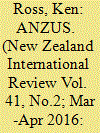

|
|
|
| 2 |
ID:
152003
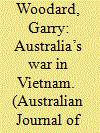

|
|
|
|
|
| Summary/Abstract |
Australia’s commitment in Vietnam can be interpreted as a small ally drawing its superpower partner into war for its own ends. Two studies by eminent Australian authors throw light on the role of human agency, and in so doing bring Australian historiography of the war closer to the trend in the United States. Peter Edwards’s history just about describes Vietnam as ‘Menzies War’. However, he finds no new sources on Menzies’s mindset, and diminishes the roles of his foreign ministers, Garfield Barwick and Paul Hasluck. The late Geoffrey Bolton’s intimate biography of Hasluck shows him as an active minister and also that his private papers are thin on Vietnam, the part of his distinguished career on which he never wrote. The Cabinet meeting of 17 December 1964 reveals much more about Australian decision-making on going to war than can be gleaned from Edwards’s cursory treatment and Bolton’s second-hand account. Barwick’s different approach, and even Hasluck’s last-minute caution, show Australia had a choice. Barwick, if he had remained Foreign Minister, might have kept Australia out of the Vietnam war, so freeing it to continue to play a leading regional political role.
|
|
|
|
|
|
|
|
|
|
|
|
|
|
|
|
| 3 |
ID:
145528
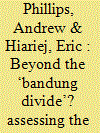

|
|
|
|
|
| Summary/Abstract |
Despite sharing many strategic interests, Indonesia and Australia have often struggled to forge effective security cooperation. In this article, the authors evaluate the ‘Bandung divide’ as a potential explanation for this difficulty. The ‘Bandung divide’ refers to the legacies of the 1955 Asian-African Conference, which saw Indonesia and Australia adopt different normative orientations towards the liberal international order, and divergent security strategies for South-East Asia. Having sketched the contours of the ‘Bandung divide’ and established its heuristic utility as a shorthand for the two countries’ divergent approaches to international order and regional security, the authors then evaluate its contemporary significance as a barrier to bilateral security cooperation in relation to two key challenges: Chinese revisionism in the South China Sea and transnational jihadist terrorism. Indonesia and Australia’s divergent approaches to regional security—themselves partially legacies of the ‘Bandung divide’—have prevented meaningful bilateral collaboration in engaging the South China Sea dispute. By contrast, the two countries have built an effective and heavily institutionalised counterterrorism partnership, proving that the ‘Bandung divide’ is not an insuperable barrier to cooperation. The highly restrictive circumstances that made this success possible nevertheless caution against unduly optimistic assumptions that the two countries will be able to forge a more comprehensive security partnership in the foreseeable future.
|
|
|
|
|
|
|
|
|
|
|
|
|
|
|
|
| 4 |
ID:
016873
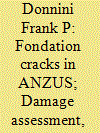

|
|
|
|
|
| Publication |
Jan-March 1994.
|
| Description |
99-114
|
|
|
|
|
|
|
|
|
|
|
|
|
|
|
|
| 5 |
ID:
138157
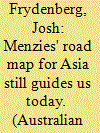

|
|
|
|
|
| Summary/Abstract |
This is an excerpt from the 2014 Sir Robert Menzies Lecture, delivered by the Honourable Josh Frydenberg, the Parliamentary Secretary to the Prime Minister and the Federal Member for Kooyong, on August 14, 2014, in the Queen's Hall at the Parliament of Victoria, Melbourne. In these remarks, I argue that Sir Robert Menzies oversaw a paradigm shift in our understanding of our neighbours and in our neighbours' understanding of us. He did so by repositioning Australia among the rising powers of Asia and by creating a coherent framework of regional engagement. For too long, the political opponents of the Liberal Party of Australia have propagated a myth that it was only Labor that truly understood our region and capitalised on its opportunities. This is patently false. The explicit denigration of Menzies and, in more recent times, John Howard and Tony Abbott for their approach to Asia should be exposed for what it is: ideologically driven, partisan polemics, which bear no resemblance to the facts. Paul Keating is wrong to suggest that in order for Australia to achieve, in his words, our ‘destiny in Asia and the Pacific’, we must somehow change our national identity and the nature of who we are. Foreign policy is about advancing the national interest and must never be a proxy for reshaping our nation's identity by stealth. As Shakespeare said, ‘What's past is prologue’, and only if we can truthfully understand the past will we be ready for the future.
|
|
|
|
|
|
|
|
|
|
|
|
|
|
|
|
| 6 |
ID:
190705
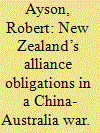

|
|
|
|
|
| Summary/Abstract |
Amidst concerns that Australia may end up in a military confrontation with China, this article evaluates New Zealand’s formal and informal alliance obligations in such an event. In keeping with Wellington’s current declaratory policy, New Zealand’s obligations would be most pressing if the attack occurred on or near Australia, although these would be less clear if China favoured coercion over violence. New Zealand is also likely to have strong alliance obligations if Australian forces were attacked in the South Pacific, the leading area for Australia-New Zealand security cooperation. If Australian forces were attacked in East Asia, New Zealand may have some obligations under the trilateral ANZUS Treaty despite the suspension of Washington’s commitments to Wellington under the same agreement. While New Zealand’s military capacity to assist Australia in maritime East Asia is limited, this is where a serious clash involving Australian and Chinese forces seems most likely. Enlarging the geographical focus of the trans-Tasman alliance may be logical in this new setting, but it could also be hazardous.
|
|
|
|
|
|
|
|
|
|
|
|
|
|
|
|
| 7 |
ID:
142085
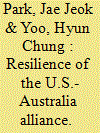

|
|
|
|
|
| Summary/Abstract |
Despite potentially significant differences between an American superpower’s and an Australian middle power’s global and regional interests and strategies, the U.S.- Australia alliance has remained resilient. Moreover, Australia has recently been very cooperative with the U.S. deployment of its military assets on Australian soil. What lies behind this intriguing set of circumstances in alliance relations? To address this question, this article begins by providing a historical overview to show that the U.S.- Australia alliance is resilient despite the lack of a mutually perceived threat. Then, this article criticizes the argument that the U.S.-Australia alliance continues because it is insurance against potential military threats, especially against potential Chinese threats. First, the likelihood of a “fundamental” attack on the Australian homeland is very slim. Moreover, the ANZUS accord lacks a formal mechanism that triggers an automatic U.S. involvement in the way that NATO’s Article Five mandates such a U.S. response in Europe. Second, currently the American and Australian threat perceptions regarding China vary. Canberra entertains less fear of a “rising China” than does Washington. Instead, this article provides order-centric rationales for retaining and strengthening the U.S.-Australia alliance, and in that context it analyzes the recent development of the alliance’s military aspects, including the deployment of U.S. Marines in Darwin on a rotational basis.
|
|
|
|
|
|
|
|
|
|
|
|
|
|
|
|
| 8 |
ID:
099756
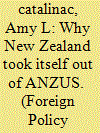

|
|
|
|
|
| Summary/Abstract |
In 1985, a dispute over nuclear ship visits led the United States to formally suspend its security guarantee to New Zealand under the trilateral ANZUS Treaty. In this article, I conceptualize this dispute as a case of intra-alliance opposition by a small state toward its stronger ally. I generate four hypotheses from the literature on alliances in international relations to explain why New Zealand chose to oppose its ally on the nuclear ships issue. Using new evidence, including interviews with 22 individuals involved in the dispute and content analysis of debates in the New Zealand parliament from 1976 to 1984, I conclude that a desire for greater autonomy in foreign policy was the driving factor behind New Zealand's opposition.
|
|
|
|
|
|
|
|
|
|
|
|
|
|
|
|
| 9 |
ID:
100266
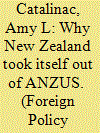

|
|
|
|
|
| Publication |
2010.
|
| Summary/Abstract |
In 1985, a dispute over nuclear ship visits led the United States to formally suspend its security guarantee to New Zealand under the trilateral ANZUS Treaty. In this article, I conceptualize this dispute as a case of intra-alliance opposition by a small state toward its stronger ally. I generate four hypotheses from the literature on alliances in international relations to explain why New Zealand chose to oppose its ally on the nuclear ships issue. Using new evidence, including interviews with 22 individuals involved in the dispute and content analysis of debates in the New Zealand parliament from 1976 to 1984, I conclude that a desire for greater autonomy in foreign policy was the driving factor behind New Zealand's opposition.
|
|
|
|
|
|
|
|
|
|
|
|
|
|
|
|
|
|
|
|
|